Understanding Active Pharmaceutical Ingredients (APIs) An Essential Component in Drug Development
Active Pharmaceutical Ingredients (APIs) are the cornerstone of drug development, playing a crucial role in the efficacy and safety of pharmaceutical products. APIs are the biologically active compounds within medications that produce the intended therapeutic effect. In this article, we will explore the importance of APIs, their role in drug formulation, the challenges faced in their production, and the future trends in the industry.
What are APIs?
APIs refer to the substances in a pharmaceutical drug that are responsible for the drug's action in treating diseases or health conditions. For instance, in a pain relief medication, the API would be the substance that directly alleviates pain, such as ibuprofen or acetaminophen. APIs can be derived from various sources, including natural products (such as plants or animals), synthetic chemical compounds, and biotechnology processes (like genetically engineered microorganisms).
The Role of APIs in Drug Development
In the realm of pharmaceuticals, the development of a new drug involves several stages, and the API is integral to each of these stages. Initially, researchers identify potential compounds that could have therapeutic benefits. After a series of preclinical and clinical trials to assess the efficacy and safety of these compounds, the chosen API is then formulated into a final medicinal product.
The formulation process includes combining the API with excipients, which are inactive substances that serve as carriers for the API, improving the drug's stability, absorption, and overall effectiveness. For example, in tablet formulations, excipients might include binders, fillers, and coatings that assist in the drug's delivery and release in the body.
Challenges in API Production
The production of APIs is a highly complex and regulated process. There are several challenges that manufacturers face, including
1. Regulatory Compliance APIs must be manufactured in accordance with Good Manufacturing Practices (GMP) to ensure their quality and safety. Regulatory agencies, such as the Food and Drug Administration (FDA) in the United States and the European Medicines Agency (EMA) in Europe, enforce stringent guidelines that must be met throughout the production process.
2. Quality Control Maintaining consistent quality in API production is crucial. Any variation in the synthesis process can affect the drug’s potency, stability, and safety. Robust quality control measures must be in place, including rigorous testing and validation processes.
active pharma ingredients list

3. Cost and Scalability Developing and producing APIs can be expensive, particularly for new and innovative compounds. Balancing production costs with the need for high-quality outputs can be a significant challenge, especially for start-ups and smaller companies.
4. Supply Chain Vulnerabilities The global nature of the pharmaceutical industry means that API production often relies on international supply chains. Disruptions such as political instability, natural disasters, or pandemics can have a major impact on availability and pricing.
Future Trends in the API Market
The landscape of API production is evolving rapidly, driven by advancements in technology and changes in market demand. Some of the key trends shaping the future include
- Biotechnology The rise of biopharmaceuticals—drugs produced using biological sources—has led to an increased demand for biologically derived APIs. Techniques such as recombinant DNA technology and monoclonal antibody production are becoming more prevalent.
- Personalized Medicine As the healthcare industry moves towards personalized medicine, there is a growing need for APIs that can be tailored to individual patients' genetic profiles. This shift will require innovative approaches in the development and production of APIs.
- Sustainability Environmental concerns are prompting manufacturers to adopt more sustainable practices in API production. Innovations such as greener synthesis methods and waste reduction strategies are gaining momentum within the industry.
- Digitalization The integration of digital technologies into API manufacturing processes is expected to enhance efficiency and reduce costs. Solutions such as artificial intelligence and machine learning can help in process optimization and predictive maintenance.
Conclusion
Active Pharmaceutical Ingredients are vital to the pharmaceutical industry, driving the development of effective and safe medications. Despite the challenges faced in their production, the trends in biotechnology, personalized medicine, sustainability, and digitalization herald a promising future for APIs. As the industry continues to innovate and evolve, APIs will remain at the forefront of advances in healthcare, ensuring the provision of high-quality therapeutic options for patients worldwide.

